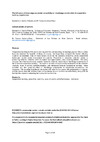Identificador persistente para citar o vincular este elemento:
https://accedacris.ulpgc.es/jspui/handle/10553/45642
| Campo DC | Valor | idioma |
|---|---|---|
| dc.contributor.author | García Almeida, Desiderio Juan | en_US |
| dc.contributor.author | Cabrera Nuez, María Teresa | en_US |
| dc.date.accessioned | 2018-11-22T11:26:30Z | - |
| dc.date.available | 2018-11-22T11:26:30Z | - |
| dc.date.issued | 2020 | en_US |
| dc.identifier.issn | 1469-7874 | en_US |
| dc.identifier.other | WoS | - |
| dc.identifier.uri | https://accedacris.ulpgc.es/handle/10553/72887 | - |
| dc.description.abstract | Cooperative learning techniques in teaching activities are becoming increasingly popular. Many studies have documented the benefits of these techniques, but fewer have analysed the factors affecting students’ achievement. One of those factors could be the student’s proactivity, since cooperative techniques require active involvement of students. Proactivity or proactive behaviour relates to pioneering behaviour, initiative taken to exploit new opportunities, and a leading attitude. This study analyses the influence of several aspects related to students’ proactivity on knowledge construction in the context of cooperative learning. The aspects included in the proactivity framework are the student’s creativity, locus of control, self-effectiveness, and motivation towards cooperative learning. These variables and their potential effect on knowledge construction in cooperative experiences are discussed. The resulting hypotheses are tested with data from students who participated in a jigsaw, and the results show the positive impact of the internal locus of control and self-efficacy, along with the fact that the student is attending the course for the first time. | en_US |
| dc.language | eng | en_US |
| dc.relation.ispartof | Active Learning in Higher Education | en_US |
| dc.source | Active Learning In Higher Education [ISSN 1469-7874], v. 21 (1), p. 79-92 | en_US |
| dc.subject | 58 Pedagogía | en_US |
| dc.subject.other | Cooperative Learning | en_US |
| dc.subject.other | Student Motivation | en_US |
| dc.subject.other | Locus of Control | en_US |
| dc.subject.other | Creativity | en_US |
| dc.subject.other | Self Efficacy | en_US |
| dc.subject.other | College Students | en_US |
| dc.subject.other | Foreign Countries | en_US |
| dc.title | The influence of knowledge recipients' proactivity on knowledge construction in cooperative learning experiences | en_US |
| dc.type | info:eu-repo/semantics/Article | en_US |
| dc.type | Article | en_US |
| dc.identifier.doi | 10.1177/1469787418754569 | en_US |
| dc.identifier.scopus | 85041327327 | - |
| dc.identifier.isi | 000515006800007 | - |
| dc.contributor.authorscopusid | 39161192400 | - |
| dc.contributor.authorscopusid | 57200437663 | - |
| dc.contributor.authorscopusid | 56427604000 | - |
| dc.identifier.eissn | 1741-2625 | - |
| dc.description.lastpage | 92 | en_US |
| dc.identifier.issue | 1 | - |
| dc.description.firstpage | 79 | en_US |
| dc.relation.volume | 21 | en_US |
| dc.investigacion | Ciencias Sociales y Jurídicas | en_US |
| dc.type2 | Artículo | en_US |
| dc.contributor.daisngid | No ID | - |
| dc.contributor.daisngid | 34960787 | - |
| dc.description.numberofpages | 14 | en_US |
| dc.utils.revision | Sí | en_US |
| dc.contributor.wosstandard | WOS:Garc?a-Almeida, DJ | - |
| dc.contributor.wosstandard | WOS:Cabrera-Nuez, MT | - |
| dc.date.coverdate | Marzo 2020 | en_US |
| dc.identifier.ulpgc | Sí | en_US |
| dc.contributor.buulpgc | BU-ECO | en_US |
| dc.description.sjr | 1,242 | - |
| dc.description.jcr | 4,765 | - |
| dc.description.sjrq | Q1 | - |
| dc.description.jcrq | Q1 | - |
| dc.description.ssci | SSCI | - |
| dc.description.erihplus | ERIH PLUS | - |
| item.fulltext | Con texto completo | - |
| item.grantfulltext | open | - |
| crisitem.author.dept | GIR Organización y dirección de empresas (Management) | - |
| crisitem.author.dept | Departamento de Economía y Dirección de Empresas | - |
| crisitem.author.dept | Departamento de Economía y Dirección de Empresas | - |
| crisitem.author.orcid | 0000-0002-4737-5913 | - |
| crisitem.author.parentorg | Departamento de Economía y Dirección de Empresas | - |
| crisitem.author.fullName | García Almeida, Desiderio Juan | - |
| crisitem.author.fullName | Cabrera Nuez, María Teresa | - |
| Colección: | Artículos | |
Citas SCOPUSTM
20
actualizado el 08-jun-2025
Citas de WEB OF SCIENCETM
Citations
18
actualizado el 08-feb-2026
Visitas
396
actualizado el 16-ene-2026
Descargas
61
actualizado el 16-ene-2026
Google ScholarTM
Verifica
Altmetric
Comparte
Exporta metadatos
Los elementos en ULPGC accedaCRIS están protegidos por derechos de autor con todos los derechos reservados, a menos que se indique lo contrario.
